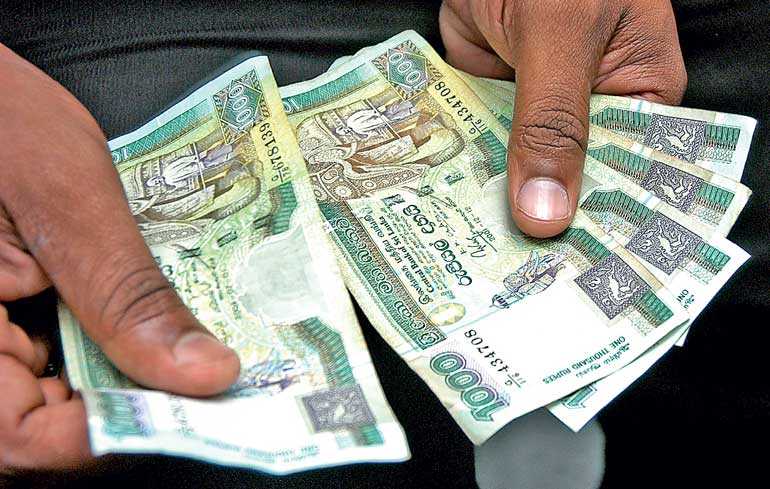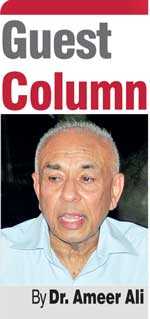Sunday Feb 15, 2026
Sunday Feb 15, 2026
Tuesday, 25 September 2018 00:00 - - {{hitsCtrl.values.hits}}

Further depreciation of the rupee is inevitable
The Sri Lankan Rupee hit a record low of 170 per $ last week, and the Minister of Finance warns of further depreciation. This is inevitable given the chaotic state of the nation’s economy.
While the rupee turns south, CoL (cost of living) has no other direction but to go north. Prices of all imported final and intermediate goods will have to increase unless artificially controlled, at heavy cost, through subsidies, which will earn the wrath of IMF, the CEO of Sri Lanka’s economy.
Whether the rupee is depreciating due to external pressures, as the Governor of Central Bank contends, or domestic mismanagement, it is the poor consumer who ultimately falls victim to this volatility. 
This is the price a small economy like Sri Lanka has to pay for adopting the neoliberal free market model while (a) ignoring the basic condition of balancing the national budget, (b) neglecting the domestic production sector, (c)borrowing at will to spend on glamorous and politically motivated projects and (d) allowing corruption to run riot.
Currency stability is a must to keep prices steady and inject an element of certainty and predictability in private economic planning, management and investment. To achieve that stability in an open economy domestic budget deficit and current account deficit in the balance of payments must be kept manageable. Sri Lanka has failed on both fronts, particularly during the last couple of decades.
The causes for this failure go beyond simple macroeconomics. There is a limit to Central Bank’s intervention in the currency market. There are fundamental issues which have to be tackled boldly on bipartisan basis if the economy were to remain competitive, rupee value steady and households make both ends meet.
National reconciliation
To start with, the immense cost of the foolish civil war and the snail-paced progress in achieving reconciliation continue to thwart the prospects of a vibrant economy emerging in the near future. Officially published growth data and economic and financial measures recommended by pundits do not reveal the noneconomic reality that impinges upon the economy.
How does one expect the national economy to perform at its optimum when a significant sector of its population resource remains frustrated and being unable to cooperate fully in the process of national development? In a plural society economic development must be a concerted national effort and should result from the synergy of the whole rather than from energy of its parts.
Public policies should be politically, ethnically, religiously and culturally neutral if they are to pull the nation together in the drive for growth and development. Domestic production sector will yield only suboptimum results if sections of its participants are deliberately or subtly kept out of it for political or other reasons. Even when policies are neutral, their execution is not.
Entrepreneurship and innovative talent are not the monopoly of any demographic group and no policy or program should discriminate between the different components of the social plurality. There is a lot for Sri Lanka to learn in this respect from the experience of a successful plural society like Singapore.
Although on surface, national reconciliation does not seem to be strictly an economic issue, yet in reality it is strongly linked with the nation’s economy. To ignore this fact and drag the issue without final solution is to jeopardise the future real economic growth and development.
Live within means
Secondly, it is simple common sense that a prudent householder should live within his or her means to avoid falling into debt and lose family assets. This principle applies equally to a nation and its government. However, there are expenses that a government has to incur to increase wealth and prosperity with distributive justice. To meet those expenses government has to raise revenue. The issue is how to raise that revenue economically and efficiently with fairness.
There are only two alternatives to raise revenue: taxes and borrowing. A third option, foreign aid, is now out of fashion. Without going into details of these options, it can be stated summarily that Sri Lanka’s borrowings have not been strictly driven by economic necessity, while taxes have not been based on principles of efficiency and equity.
As a result, reckless borrowing, more to satisfy the political whims of leaders than to create a productive economy, has increased national debt, and the burden of servicing that debt has fallen even on the shoulders of people who are not yet born. (Let us remember that it was foreign debt that forced the once mighty Ottoman Empire to lose its North African territories,which were colonised by European powers in the 19th century.)
On the other hand, the tax structure has shifted the burden of obligation disproportionately on the unaffordable. The super-rich, through various mechanisms and concessions have been allowed to slip out of the tax net. As a result Government tax revenue is far below the actual taxable income generated in the economy.
The unwillingness of the Government combined with the incapacity of its Tax Department to nab high income earners while resorting to borrow without limit has worsened budget deficits. A debtor’s currency therefore has to depreciate forcing prices to rise and when that rise combines with falling disposable income to the lower stratum of society CoL becomes unbearable to the majority.
Rampant corruption
A third element that makes CoL even more unbearable is the rampant corruption in the public sector. With the Central Bank’s bond scam corruption has reached its pinnacle. This is a malignant cancer, which without immediate surgery will kill the polity and economy.
For an ordinary citizen, nothing moves, according to public opinion, from a Government clerk’s desk to that of the minister in charge without bribing someone. How does the Tax Department for example expect to raise revenue when its own assessors after issuing tax notice from the office visits the recipient after office hours and advice for a fee how to dodge the tax? Even the Bribery Commission appointed to eradicate this evil is itself being accused of corruption.
The private sector, which is expected to operate with greater efficiency, has no choice but to function in a corrupt public environment absorbing thereby unnecessary costs, which, ultimately, will be passed on to the final consumer. Thus, a depreciating currency, gross neglect of local production through discriminatory public policies, recurring budget deficits, falling exports, rising imports, unfair taxes and rampant corruption, all end up in accelerating the rise in cost of living.
Neither the Yahapalana Government, which is disunited, disabled and bankrupt of originality in economic direction, nor the Joint Opposition, which is simply focused in trying to oust the rulers through Janabalaya, seems to have any credible solution to bring down the escalating cost of living.
The rupee’s southbound, CoL’s northbound journeys are the end product of other issues discussed earlier. Reconciliation, budget deficits, unfair taxes and corruption have made difficult for householders to make both ends meet.
While income through legitimate means fails to satisfy even the basic needs of ordinary families, the more daring among them resort to illegitimate means in search of supplementary income. That leads to other more despicable social evils and criminal offences.
Within the ruling neoliberal economic model, tinkering at the margins is not going to bring relief to householders. The fundamental issues have to be tackled with determination even if it involves a partial and temporary curtailment of some civil liberties.
Sri Lanka desperately needs a third alternative to pull itself and its people out of the current malaise.
(The writer is attached to the School of Business and Governance, Murdoch University, Western Australia.)